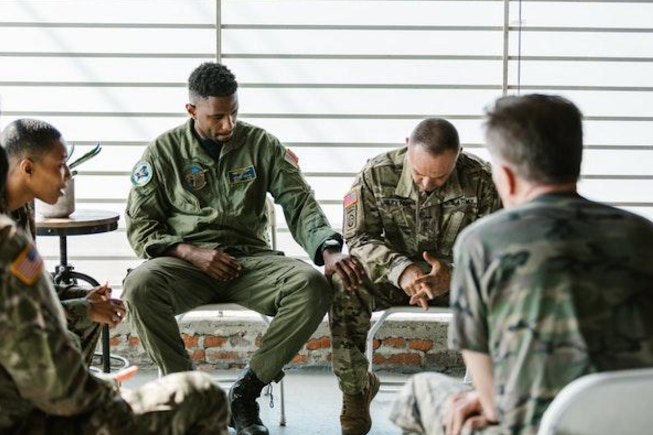Heroes take on many forms in our lives. From the athletes we cheer for to the superheroes on the silver screen, we often celebrate those whose names we see emblazoned on jerseys, posters, and billboards. But true heroes don't always stand in the spotlight. Veterans—men and women who have dedicated their lives to protecting the freedom and safety of others—are heroes whose stories are often written in the quiet medals and ribbons they wear on their chests.
This image highlights the poignant truth: if you're looking for a real hero, you won't find them on the back of a jersey but in the brave chest of a veteran adorned with medals of sacrifice and service.
What Defines a Hero?
For centuries, societies have upheld certain ideals of what it means to be a hero. Often, it involves acts of bravery, courage, and selflessness. Traditional heroes were warriors, leaders, and those who fought battles for the protection and well-being of their communities. But in today's world, heroism has taken on a more expansive meaning.
Modern-day heroes can be found in many walks of life. Firefighters, healthcare workers, and even athletes are revered for their contributions. But what makes a veteran stand out among these heroes?
The Role of Veterans in Society
Veterans play a unique role in shaping the security and identity of nations. Their willingness to serve and the sacrifices they make go far beyond what most people can imagine. Veterans put their lives on the line, not for personal gain or glory, but for the safety, security, and freedom of their fellow citizens.
Their impact is not only felt on the battlefield. Veterans contribute to communities as leaders, mentors, and advocates. Through their experiences, they help preserve the values of liberty, freedom, and justice that form the backbone of any thriving society.
Veterans vs. Sports Icons: A Comparison
Why do we so often idolize athletes? We celebrate sports stars for their physical prowess, mental toughness, and ability to overcome challenges. They become the heroes of the masses, with their names emblazoned on jerseys for millions to see.
But veterans embody many of the same qualities we admire in athletes—courage, endurance, and perseverance—yet their heroism is often unsung. While we may cheer for our favorite sports heroes on the field, veterans fight for real-life stakes, often without the same recognition or applause.
The Importance of Veterans' Medals and Honors
Every medal and every ribbon on a veteran's uniform tells a story. These symbols of service and sacrifice are far more than just decorative pieces. They represent the challenges, struggles, and victories experienced by those who serve in the military.
From Purple Hearts to Distinguished Service Crosses, these honors are awarded for acts of bravery, leadership, and dedication. Understanding what each of these medals represents is crucial to appreciating the total weight of a veteran's experience.
The Emotional Power of Veterans' Uniforms
A veteran's uniform isn't just fabric and thread. It is a testament to the sacrifices made, the battles fought, and the comrades lost. Each medal, badge, and service stripe holds deep emotional significance, not only for the veterans but for their families and fellow servicemen and women.
When you look at the chest of a veteran, you're not just seeing symbols; you're seeing a lifetime of commitment, bravery, and sacrifice.
Heroes Off the Battlefield
Many veterans continue to serve their communities even after their military ends. Veterans often take on roles as educators, advocates, and community leaders, using their unique experiences to inspire and guide others. Their courage and perseverance continue to shape society long after they've hung up their uniforms.
Why Society Needs to Appreciate Veterans More
Despite their immense contributions, many veterans go unrecognized in civilian life. It's easy to overlook the depth of their sacrifices when their battles take place far from home. But veterans deserve recognition for preserving the freedoms we often take for granted.
Honoring Veterans through Actions, Not Just Words
Words of gratitude are essential, but actions speak louder. Simple acts of kindness—like supporting veteran organizations, attending events, or just listening to a veteran's story—can make a difference. It's about more than just saying "thank you"; it's about showing appreciation through our actions.
Veterans are more than just heroes; they embody sacrifice, dedication, and service. Their stories are etched into the medals and honors that adorn their chests, and it's time we recognize them for the heroes they are.
Next time you think of a hero, remember: you don't need to look at the back of a jersey to find one. The real heroes are those who wear their stories on their chests—the veterans who have fought for freedom, honor, and peace.
FAQs
1. What are some ways to honor veterans daily?
You can honor veterans by supporting veteran charities, attending memorial events, or simply reaching out to thank a veteran for their service.
2. Why do we often forget about veterans' contributions?
Many veterans serve quietly, and their sacrifices may not be immediately visible in everyday life, leading to a lack of recognition.
3. How can schools educate students about veterans?
Schools can incorporate veteran history into their curriculum, invite veterans to speak, and celebrate veterans' holidays like Veterans Day.
4. What's the most common misunderstanding about veterans?
One common misconception is that all veterans suffer from trauma, but many live fulfilling lives post-service, contributing positively to their communities.
5. How can communities help support veterans transitioning into civilian life?
Communities can offer employment opportunities, counseling services, and social support to help veterans smoothly transition into civilian life.




